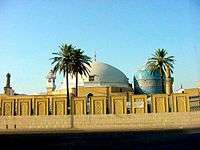İsmailağa
İsmailağa Jamia or İsmail Ağa Jamia (Turkish: İsmailağa Cemaati) is a branch of the Gümüşhanevî Dergâh of Nakşibendi-Khālidī Ṭarīqah (Sufi Order) in Turkey.
It takes its name from the İsmailağa Mosque in Fatih, Istanbul. It is aligned with the Naqshbandi spiritual order of Sunni Islam Sufism[1] in the silsilah of Khalidiyya and is led by Mahmut Ustaosmanoğlu, imam of the İsmailağa Mosque from 1954 to 1996. It has significant influence over daily life in few streets of Fatih, the capital district of Istanbul. However, once in 2006 a politician had described the whole district of Fatih as an "İsmailağa republic".[2] There are communities in a number of other cities in Turkey, including Erzincan.
Characteristics
According to Ahmet Hakan Coşkun, the jamia requires strict Islamic-clothing, with members wearing beards, Kaftans, and shalwar trousers, and turbans of white muslin when praying. Women wear a face-covering Çarşaf (chador).[1][3] A number of leading Turkish politicians are associated with the wider Naqshbandi order; Prime Minister Recep Tayyip Erdoğan is said to have links with the stricter İsmailağa branch.[4] This might explain how the wire-tapping ordered by public prosecutor İlhan Cihaner in 2007 to 2009 in relation to İsmailağa included Erdoğan.[5]
Their most famous imam is Ahmet Mahmut Ünlü alias Cübbeli Ahmet Hoca.
History
In the 1990s the group sent missionaries to parts of the Caucasus (particularly Azerbaijan), and trained people at its madrassa in the İsmailağa Mosque. The work continued more slowly after new restrictions on religious activities in Turkey 1997.[6]
The İsmailağa Jamia came to wider public attention in Turkey through three murders committed in the İsmailağa Mosque - the son-in-law of Mahmut Ustaosmanoğlu in 1998 and in 2006 a retired imam and the man who stabbed him, who was lynched.[1][7][8]

From 2007 to 2009 the local Chief Public Prosecutor in Erzincan, İlhan Cihaner, investigated the community and ordered wire-tapping after reports of the community offering unauthorised Koran courses and preventing girls from attending school.[1]
References
- 1 2 3 4 Ahmet Şık, Niyazi Dalyancı, habervesaire.com, 18 February 2010, Warfare between judiciary and government
- ↑ Hurriyet Daily News, 11 September 2006, CHP's Baykal: An "Ismailaga" republic has been formed in Fatih
- ↑ Ahmet Hakan Coşkun, 4 September 2006, Bir cemaatin anatomisi
- ↑ Angel Rabasa, F. Stephen Larrabee (2008), The Rise of Political Islam in Turkey, Rand Corporation, 17 June 2008
- ↑ Today's Zaman, 28 April 2013, Cihaner may tell commission about how he wiretapped PM
- ↑ Bayram Balci, alati.com.br, Between Islam and Secularism: Religious Policies of Turkey in the Turkish Republics of Central Asia and the Caucasus, p115-6
- ↑ Hurriyet Daily News, 12 September 2006, Questions arise in Turkish Parliament over Ismailaga Mosque murder
- ↑ Today's Zaman, 5 March 2012, No progress in imam Bayram Ali Öztürk’s murder case in five years
